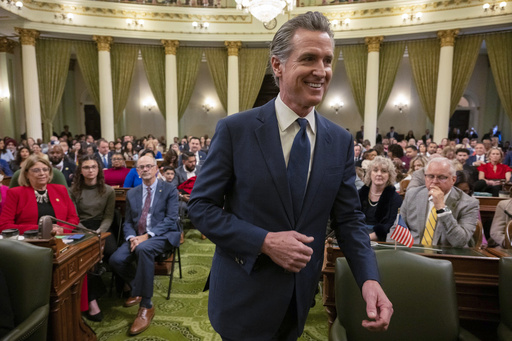The Environmental Protection Agency (EPA) has approved two requests from California on Wednesday to implement strict vehicle emissions standards, which include a new regulation that aims to eliminate the sales of new gasoline-powered vehicles in the state by the year 2035. This decision could be reversed by the incoming Trump administration.
California’s new regulations are more stringent than the federal standards established earlier this year, which do tighten emissions requirements but do not mandate electric vehicle sales. The EPA’s examination concluded that those opposing the waivers failed to demonstrate how the electric vehicle (EV) mandate or another regulation concerning heavy-duty vehicles contradicted the federal Clean Air Act.
EPA Administrator Michael Regan stated, “California has longstanding authority to request waivers from EPA to protect its residents from dangerous air pollution coming from mobile sources like cars and trucks.” He added that the approvals align with the EPA’s commitment to collaborate with states in reducing emissions and tackling climate change.
This waiver carries significant implications, not just for California, but also for over a dozen states that adhere to its leading standards regarding vehicle emissions. Nevertheless, the approval may be temporary. President-elect Donald Trump has expressed intentions to rescind all California waivers, advocating for a policy that favors the oil industry while boosting fossil fuel production and rolling back crucial components of a major climate law established in 2022.
Trump previously revoked California’s emissions authority in 2019, a decision that the Biden administration later overturned, restoring the state’s authority in 2022. If the new administration attempts to backtrack these regulations, it could lead to a fresh wave of legal disputes that may prolong any implementation processes.
California Governor Gavin Newsom, a vocal advocate for climate leadership, remarked that the EPA’s sanctioning of the advanced clean-cars rule demonstrates a commitment to California’s success in safeguarding public health by improving air quality and reducing pollution. “Opponents like President-elect Trump would side with the oil industry over consumers and American automakers, but California will continue to innovate in the marketplace,” Newsom asserted.
Major automotive manufacturers such as Ford, Honda, and Volkswagen are currently compliant with California’s emissions standards, yet some companies have expressed concerns over this recent EPA waiver. The Alliance for Automotive Innovation, a significant industry association, has noted that many Democratic-leaning states that adhere to California’s regulations are falling short of the upcoming targets for electric vehicle sales. According to their assessment, the 2035 goal of reaching 100% electric vehicle sales seems increasingly unachievable.
John Bozzella, the CEO of the Alliance for Automotive Innovation, stated, “Achieving the sales mandates under current market realities will take a miracle. A balance is necessary, and some states should reconsider joining the California program.” He acknowledged that while automakers are developing electric vehicles, a considerable divide exists between proposed EV sales targets and consumer expectations for vehicle choice.
Toyota’s North American spokesperson Scott Vazin voiced concerns regarding the potential effects of California’s waiver, stating, “This approval will skew the auto industry, forcing companies to prioritize zero-emission vehicles in states that follow California’s regulations.” He warned that this may lead to a lack of non-electric vehicle options for consumers in those states, complicating their transportation needs.
Environmental advocates praised the Biden administration’s decision. Paul Cort, director of the Earthjustice’s Right To Zero campaign, called the EPA’s approval a pivotal advancement in safeguarding public health from pollution while also alleviating financial burdens associated with combustible fuels. Kathy Harris, director of clean vehicles for the Natural Resources Defense Council, emphasized the importance of respecting California’s choices in pursuing cleaner vehicles, asserting that states that oppose California’s method are not obliged to follow suit.
The EPA’s decision coincides with the Supreme Court’s recent agreement to review a business-backed challenge to an earlier California waiver issued by the Biden administration. The justices will not assess the waiver itself but will consider whether fuel producers possess the legal standing to contest it—an issue arising after a federal appeals court ruled that the companies had not shown potential harm related to the waiver, which primarily impacts vehicle manufacturers.
